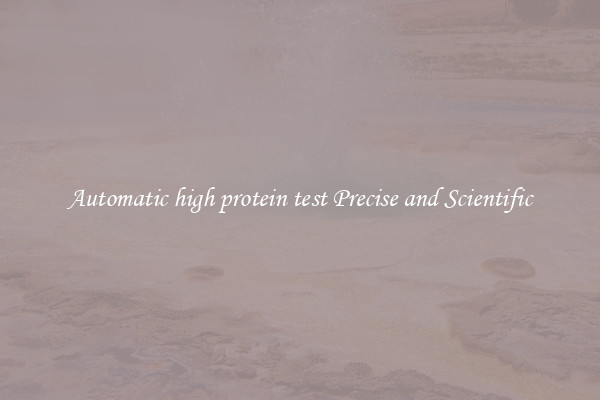Automatic high protein test Precise and Scientific
Automatic High Protein Test: Precise and Scientific

Protein is a vital macronutrient that plays a crucial role in our body's overall health and function. It is responsible for building and repairing tissues, producing enzymes and hormones, and supporting the growth and development of muscles, bones, and organs. Hence, the accurate measurement of protein levels in various substances, such as food, beverages, and biological samples, is of utmost importance. To meet this need, technological advancements have led to the development of automatic high protein tests, which provide precise and scientific results.
The automatic high protein test is a cutting-edge solution that utilizes advanced laboratory equipment and techniques to determine the protein content in a particular sample. This method eliminates human errors and subjectivity associated with manual protein testing, ensuring more reliable and reproducible results. It is based on established scientific principles and follows standardized protocols, guaranteeing accuracy and consistency across different laboratories.
One of the key advantages of automatic high protein tests is their speed and efficiency. Traditional protein testing methods often require significant time and effort, involving various steps such as sample preparation, chemical reactions, and data analysis. In contrast, automated tests streamline these processes, significantly reducing the turnaround time. This enables laboratories to generate protein measurement results quickly, facilitating faster decision-making and enhancing overall productivity.
Furthermore, automatic high protein tests offer exceptional precision and sensitivity. They can detect proteins at even very low concentrations, enabling the identification of minute changes in protein levels. This level of accuracy is particularly essential in industries such as food and beverage, where protein content directly influences product quality and labeling compliance. Ensuring precise measurements of protein content also allows for better nutritional analysis, helping individuals make informed dietary choices based on their protein needs.
Apart from its utility in food analysis, the automatic high protein test has significant applications in medical and clinical settings. Protein analysis in biological samples, such as blood, urine, or tissues, is fundamental in various diagnostics and research studies. By automating the protein testing process, the results become reliable and consistent, aiding in the identification of disease markers, monitoring treatment efficacy, and facilitating scientific discoveries.
In conclusion, the automatic high protein test represents a remarkable advancement in protein analysis. Its precision, scientific basis, and efficiency make it an indispensable tool in a range of industries, including food and beverage manufacturing, nutritional analysis, and medical diagnostics. With its ability to provide fast and accurate protein measurements, this technology ensures that decisions related to product quality, nutritional labeling, and healthcare are based on reliable data. As science continues to evolve, automatic high protein tests are expected to play an increasingly significant role in improving our understanding of protein-related processes and promoting better health outcomes.

View details

View details

View details

View details








